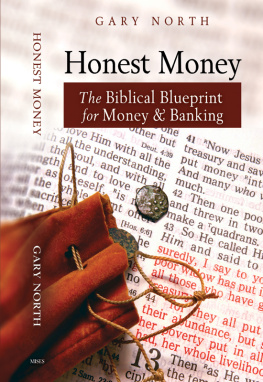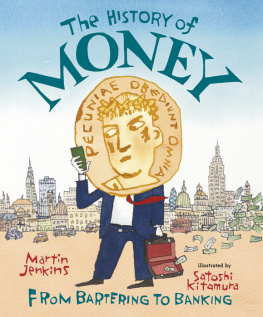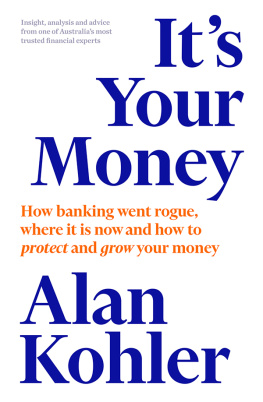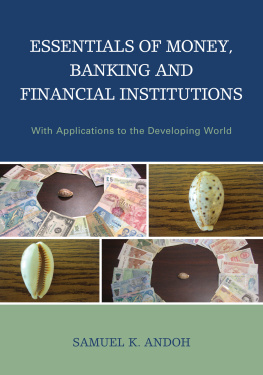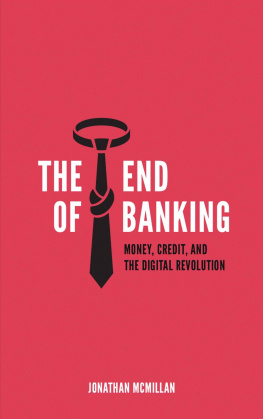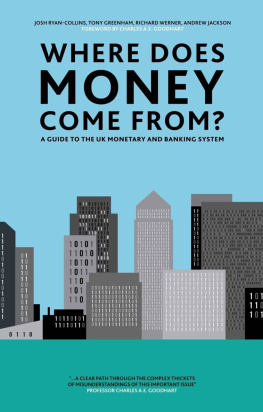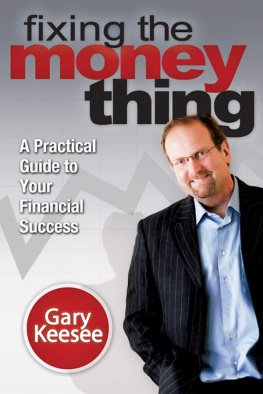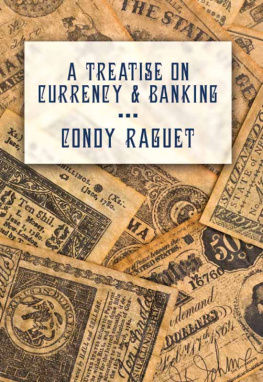HONEST MONEY
HONEST MONEY
The Biblical Blueprint for
Money and Banking
Gary North

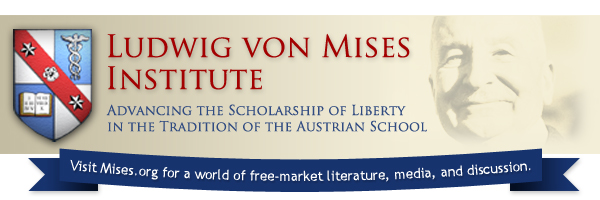
More information on biblical economics can be obtained from garynorth.com . See the section, Capitalism and the Bible.
Copyright Gary North, 1986, 2005
Copyright 2011 by the Ludwig von Mises Institute and published under the Creative Commons Attribution License 3.0. http://creativecommons.org/licenses/by/3.0/
Ludwig von Mises Institute
518 West Magnolia Avenue
Auburn, Alabama 36832
Mises.org
ISBN: 978-1-61016-193-0
Table of Contents
INTRODUCTION
This is a book about money, a subject that has defied analysis by professional economists for as long as there have been professional economists. At the same time, it is a topic for which the most ill-informed people think they have the answers. Very often the most ill-informed people are professional economists.
I will give you an example. In the fall of 1985, I suggested to a research assistant to a Congressman that he conduct a quick study of the Mexican peso. I thought that the sharp increase in cashAmerican money in circulationmight be explained by Mexican nationals substituting dollars for pesos in Mexico. At the time that he began his investigation, the peso was selling for about 250 per dollar. I suggested that he ask a staff economist at the Federal Reserve System, our nations central bank, if he thought that Mexicans were hoarding cash dollars. I suspected that Mexican citizens were using the U.S. dollar as a substitute for the collapsing peso.
He phoned back a few days later. Two staff economists, one of whom was a specialist in the Mexican economy, had told him that it was quite unlikely that Mexicans were hoarding dollars, because Mexicans could take cash dollars to their local bank, exchange their dollars for pesos, and the bank would pay them interest in pesos.
Within one week, the peso fell to 500 to the dollar. Thus, anyone who had followed the advice of the expert economists had lost half of his capital. On the other hand, those who had bought cash dollars with their pesos and never went near a bank had doubled their money (pesos). In short, a lot of illiterate Mexican peasants knew more about practical economics in an inflationary economy than Federal Reserve economists knew. Somehow, this discovery did not surprise me.
A few months later, a report on the apparent disappearance of American cash appeared in the newspapers. It said that Federal Reserve economists now think that people in foreign countries are using American bills instead of their depreciating national currencies. So much for the consistent views of economists. They just dont agree on much of anything, except the need to keep economists on the payroll.
The Crisis We Face
There is a debt crisis in the making. It is international. Every industrial nation on earth faces a crisis that could dwarf the crisis of the 1930s. There are no pain-free solutions. There will be widespread defaults on a scale greater than those in the fall of 2008. The practical forecasting questions we need to get answered are these: How soon will the default come? What kind of default will it be?
This book asks a different question: What violations of the principles of the Bible did the West commit that led us into this mess? It also asks this question: What should we build on the ruins of the present system after the collapse?
There are Biblical alternatives. If we had adopted them 500 years ago, or 100 years ago, or even 50 years ago, we would not be facing the monetary crisis that we now face. But we didnt adopt them, so we are facing it.
CHAPTER ONE
THE VALUE OF MONEY
So when the money failed in the land of Egypt and in the land of Canaan, all the Egyptians came to Joseph and said, Give us bread, for why should we die in your presence? For the money has failed. (Genesis 47:15)

Daniel Defoe wrote a novel in 1719 about a man whose ship sank, and who wound up on a deserted island for 28 years. It was called Robinson Crusoe. Crusoe faced a hostile world. How was he going to overcome scarcity? He needed food, clothing, and shelter. Fortunately for him, he was able to get a lot of his tools from the ship; if he hadnt, he wouldnt have survived even 28 days.
Economists love to use Robinson Crusoe as their example when they begin an introductory textbook on economics. Why? Because he was alone initially. In discussing Crusoe, economists dont have to begin with the difficult problems of the division of labor and voluntary trade. Only when the economist has explained basic production, saving, and the allocation of time and capital does he introduce Friday, the native partner. That was Defoes strategy, too.
The textbook Crusoe initially has to decide what his highest priorities are. What is his order of preferences? Is it fresh water, food, shelter, and clothing? What need does he attempt to satisfy first? The whole point of the illustration is to show that in a world of limited resources, a person has to make decisions about how to achieve his goals. He cant achieve all of them at the same time. He has to decide what he needs to dofirst, second, and so on, down to a hundred and thirty-fifth or moreand then he has to compare this list with his available resources, including his personal skills and time.
One day he may pick berries. But they dont last forever, and besides, he wants something else to eat. He can climb a tree and pick coconuts, or he can spend several hours to make a sort of poking stick that he can use to knock down fruit or coconuts from trees. But the time he spends locating a suitable stick cant be used to climb trees and get food directly. The point is that he has to give up income (food) in order to get the time to produce or discover capital (the stick).
He may want to go fishing. That means he needs a fishing pole, some line, a hook, and maybe some bait. Or he needs a net. But unless he finds the net as a free gift (the ships warehouse), he has to make it. He cant become too fancy, or else he will die of malnutrition before he finishes the project.
Decisions on Board
Say that he has a pile of goods to take from the ship. He has put together a crude and insecure raft that he can use to float some goods back to shore. The ship is slowly sinking, so he has limited time. A storm is coming up over the horizon. He cant grab everything. What does he take? What is most valuable to him? Obviously, he makes his decision in terms of what he thinks he will need on the island. He tries to estimate what tools will be most valuable, given his new environment.
The value of a tool as far as he is concerned has nothing to do with the money it cost originally. He might be able to pick up a sophisticated clock, or an expensive musical instrument, but he probably wont. He would probably select some inexpensive knives, a mirror (for signaling a passing ship), a barrel (for collecting rain water), and a dozen other simple tools that could mean the difference between life and death.
In short, value is subjective. The economist uses fancy language and says that Crusoe imputes value to scarce resources. He decides what it is he wants to accomplish, and then he evaluates the value to him personally of each tool. In other words, the value of the tool is completely dependent on the value of the tools expected future output. He mentally calculates the future value of the expected future output of each tool, and then he makes judgments about the importance of any given tool in producing this output. Then he calculates how much time he has until the ship sinks, how much weight each tool contributes, how large his raft is, and how choppy the water is. He selects his pile of tools and other goods accordingly.
Next page
